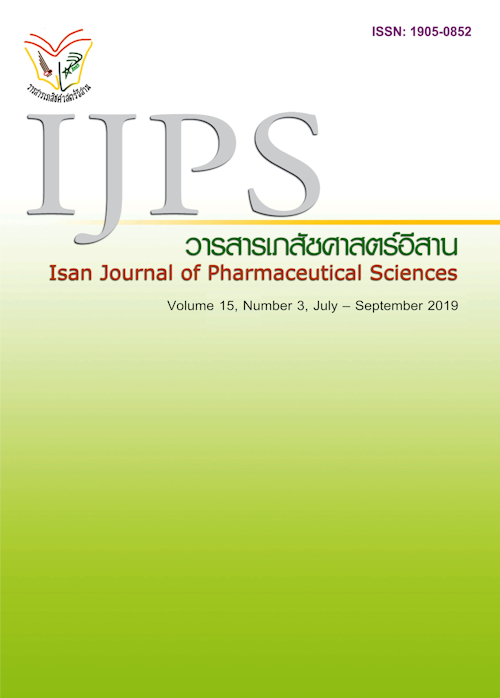Professional competency for pharmacist in Thailand and other-countries and community pharmacy clerkship in Thailand
Main Article Content
Abstract
Competency concept is applied in pharmacy professional development and pharmacy curriculum. International Pharmaceutical Federation (FIP)developed global pharmacy competency framework and categorized into 4 domains. It is a mapping tool and applicable in each country context. Objective A qualitative research aimed to analyze and interpret the document by the researcher with the topic of competency of community pharmacy. Methods We analyzed documents by coding content into themes. There are two sources of documents in this research. Primary and secondary source: research articles, annual reports, policy announcement, student manuals, and syllabi. Tertiary source: textbooks, and training materials. Results United States, Australia, Canada, England, Ireland, Japan, Singapore, and Thailand decided their pharmacy core competency corresponding to FIP; pharmaceutical public health, pharmaceutical care, and ethical in professionalism. Japan and Thailand have included competency in herbal products as the additional competency. Pharmacist must have essential knowledge, skills, and expertise in their specific competency. Pharmacy organizations and educational institutes in many countries defined pharmacy specific competency to prepare pharmacy student for the diversity of responsibilities in different practice settings. Thai pharmacy council categorized pharmacy specific competency into 3 tracks: pharmaceutical care, industrial pharmacy, and medication and health consumer protection. Conclusion According to the increasing demand of community pharmacists with their specific competency, pharmacy schools should develop their curricular and community pharmacy clerkship to support and prepare pharmacy graduate to have high competency in this area.
Article Details
In the case that some parts are used by others The author must Confirm that obtaining permission to use some of the original authors. And must attach evidence That the permission has been included
References
Atkinson J, Pozo AS, Rekkas D, et al. Hospital and community pharmacists’ perceptions of which competences are important for their practice. MDPI Pharmacy 2016; 4:1-18.
Benrimoj SI, Frommer MS. Community pharmacy in Australia. Australian Health Review. 2004;28(2): 238-46.
Burapadaja S, Abling U, Chaimeka S, Itin S. The Link between Curriculum and Learning Processes and Graduate Outcomes: Faculty of Pharmacy Chiang Mai University. Educational service and student development section; 2014.
Bureau of drug control [Online]. Nonthaburi: Food and Drug Administration; c2018 [updated 2017 Feb 28; cited 2018 Oct 8] Available from: http://www.fda.moph.go.th/sites/drug/Shared%20Documents/Statistic/Licensee-20180228.pdf
Chanakit T, Bee YL, Wongpoowarak P, Moolasarn S, Anderson C. Hospital pharmacists’ perceptions of the suitability of doctor of pharmacy graduates in hospital settings in Thailand. BMC Medical Education 2015; 15:1-15.
Chouhan VS, Srivastava S. Understanding Competencies and Competency Modeling - A Literature Survey. IOSR Journal of Business and Management (IOSR-JBM) 2014; 16:14-22.
International Pharmaceutical Federation - FIP. Transforming Our Workforce. The Hague, NL: International Pharmaceutical Federation; 2016
Maitreemit P, Pongcharoensuk P, Kapol N, Armstrong EP. Pharmacist Perceptions of New Competency Standards. Pharmacy Practice 2008; 6:113-120.
Mills E, Laaksonen R, Bates I, Davies G, Duggan C. Self-assessment of competence in a community pharmacy setting. Pharmacy Education 2005; 5(03):1–11.
Nakagawa S, Kume N. Pharmacy Practice in Japan. The Canadian Journal of Hospital Pharmacy (CJHP) 2017; 70:232-242.
National Statistical Office (NSO) [Online]. Bangkok: National Statistical Office (NSO); c2014 [updated 2018 Sep 30; cited 2018 Oct 7]Available from: http://www.nso.go.th/sites/2014
Paradis E, Zhao R, Kellar J, Thompson A. How are competency frameworks perceived and taught?. Perspect Med Educ 2018; 7:200-206.
Pharmaceutical Group of European Union. European Community Pharmacy Blueprint.Brussels: Pharmaceutical Group of European Union; 2012.
Pharmaceutical Society of Australia. The National Competency Standards Framework for Pharmacists in Australia 2016. Deakin, ACT: Pharmacy Board of Australia; 2016.
Pharmacy Education Consortium of Thailand. Community pharmacy manual 2017 (6th year). Bangkok: Pharmacy Education Consortium of Thailand; 2017.
Sadek MM, Elnour AA, Al Kalbani NMS, Bhagavathula AS, Baraka MA, Aziz AMA, et al. Community pharmacy and the extended community pharmacist practice roles: The UAE experiences. Saudi pharmaceutical journal : SPJ 2016;24(5):563-70.
Saseen JJ, Ripley TL, Bondi D, et al. ACCP Clinical Pharmacist Competencies [Online]. Lenexa, KS: The American College of Clinical Pharmacy; 2017 [cited 2017 Dec 18]; [20 screens]. Available from: https://www.accp.com/
Singapore Pharmacy Council. Competency standards for pharmacist in Singapore (entry level). Singapore: Singapore Pharmacy Council; 2011.
Suttajit S, Suwannaprom P, Chanakit T, Tangkiatkumjai M, Kongkaew C, Anderson C, et al. Competency and career preferences among pharmacy graduates 2016. Chiang Mai Thailand; 2017.
Suttajit S, Suwannaprom P, Eakanunkul S. On account of manpower: pharmacy workforce in the complexity of healthcare system. Chiang Mai: Center for Community Drug System Research and Development, Faculty of Pharmacy, Chiang Mai University; 2018.
The Competency Development and Evaluation Group (CoDEG). General Level Framework (GLF) A Framework for Pharmacist Development in General Pharmacy Practice. 2nd ed. London: National Health Service (NHS); 2007.
The National Association of Pharmacy Regulatory Authorities (NAPRA). Professional Competencies for Canadian Pharmacists at Entry to Practice. Ottawa, CA: National Association of Pharmacy Regulatory Authorities; 2014.
The Pharmaceutical Society of Ireland (PSI). Core Competency Framework for Pharmacists. Leinster, IE: The Pharmaceutical Society of Ireland (PSI); 2013.
The Pharmacy Council of Thailand. Pharmacy council announcement 18th/2012 Pharmacy Core competency of 6-years Pharm D curriculum [Online]. 2012 [cited 2018 Oct 8]; [52 screens]. Available from: https://www.pharmacycouncil.org/share/file/file_265.pdf
The Pharmacy Council of Thailand. Pharmacy council announcement 24th/2015 Structure of the 6-years Pharm D curriculum (Revised edition 2015) [Online]. 2015 [cited 2018 Oct 8]; [5 screens]. Available from: https://www.pharmacycouncil.org/index.php?option= content_detail&menuid=68&itemid=959&catid=0
Vazirani N. Competencies and Competency Model-A Brief overview of its Development and Application. SIES Journal of Management 2010; 7:121-131.
The Pharmacy Council of Thailand. Pharmacy council announcement 17th/2013 Pharmacy licensure examination core competency (PLE-CC) and Pharmacy licensure examination pharmaceutical care (PLE-PC) [Online]. 2013 [cited 2018 Oct 8]; [1 screen]. Available from: https://www.pharmacycouncil.org/share/file/file_1694.Pharmacy council announcement_2013-17_PLE-CC and PLE-IP.pdf
The Pharmacy Council of Thailand. Pharmacy council announcement 8th/2011 Professional competency of pharmaceutical care curriculum 2011 [Online]. 2011 [cited 2018 Oct 8]; [44 screens]. Available from: https://www.pharmacycouncil.org/share/file/file_260.pdf
Yano Y. Overview of the revised Pharmacy education model core curriculum and pharmacy education in Japan [serial online]. 2015 [cited 2017 Dec 24]. Available from:http://www.fip.org/menu_sitemap?page=abstracts&action=generatePdf&item=11961


